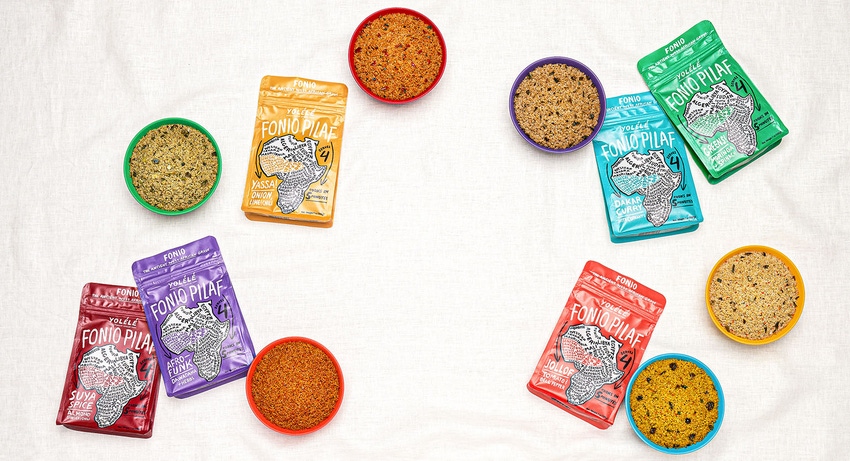Good food from the motherland
While it’s becoming easier to introduce West African cuisine to mainstream audiences, a new challenge is creating products that are more focused on health as well as allergen free and sustainable.

It’s been an uphill battle for food developers specializing in West African cuisine. Unlike Greek, Indian and Korean packaged goods, it wasn’t something one could easily snap up at a local grocery store—until recently.
As the global food community gets smaller, thanks to more people traveling and indulging in more nuanced, virtual experiences, West African products are finally getting the limelight. According to a recent New York Times article, “Nigerian food, with its rich and varied layers, will be a breakout star in the United States as chefs and diners who are unfamiliar with West African cooking start to understand it from a regional perspective, in the way a general interest in Italian cooking eventually led to an appreciation for the cuisine of Tuscany or Sicily.”
It doesn’t hurt either that the easy-on-the-eyes actor Idris Elba is rumored to be caught in the middle of a bidding war between Disney, Netflix and Paramount+ for his yet-unnamed cooking show. For its concept, Elba will showcase the culture and cuisine of his homeland, Sierra Leone.
Situated on the southwest coast of West Africa, Sierra Leone is best known for its whitesand beaches and precious minerals. Elba aims to introduce audiences to the comfort foods of his childhood, from cassava and peanut stews to suya (beef, tripe or chicken skewers marinated in a spice blend of peanuts, ginger and cayenne pepper, then grilled).
While it’s becoming easier to introduce West African cuisine to mainstream audiences, a new challenge is creating products that are healthier focused as well as allergen free and sustainable. That’s why it took time for New York chef Femi Frazier, who boasts Sierra Leonean and Senegalese heritages, to perfect his food line.
“It took around five years to develop the suya without peanuts,” Frazier said. “I traveled to Sierra Leone in 2019 to do some R&D with my childhood nanny who lives in our family house. I had to embrace my grandfather’s culture to bring the world a product that we all know and love but can enjoy without the kuli-kuli (ground nut). It’s still authentic.”
A taste of West Africa in one small package
He’s partnered with Howard Allen, founder of Brooklyn-based Maroon Sausage Co., for this endeavor. They’re using Frazier’s recipe for the nutless suya as their inspiration for a new line of West African-inspired sausages launching in spring 2023. For Allen, it’s an exciting new venture for his company, which started making Caribbean-influenced halal sausages in 2013.
“I learned about suya when I traveled to Ghana in April of 2022,” Allen said. “I went there to complete a feasibility study on Maroon’s ability to sell our products in the West African region.
“While I was there … I ate at a place called Buka in the Osu section of Accra. That’s where I had suya for the first time on a beef skewer. My mind was blown. When I got back to New York, I went to a restaurant in Harlem called Teranga, which is at the bottom of the Africa Center. I ordered the suya there as well. That’s when I knew I had to incorporate it into what I was doing at Maroon.”
With the flavor profiles of the nutless suya perfected, Allen said the next challenge is for Frazier to temper the product’s spice level.
“Because as you know, there is America hot and there is Africa hot when it comes to spice tolerance,” Allen said. “Once that’s done, our goal is to release the products and tell the story of the people who originated the flavors as a method of engaging our audience.”
A new spin on a centuries-old ingredient
It would be an understatement to say Pierre Thiam is one of the champions of West African ingredients. His New York company, Yolélé African Foods, is amplifying fonio, the ancient African grain that may be used as a healthier alternative to rice, grits and other popular starches. He’s also using it to create fonio chips in flavors like sea salt and BBQ.
While the Senegalese chef and restaurateur sources fonio from West Africa, he’s made it his mission to become a vital part of the region’s food system. His Mali-based processing facility, Sustainable African Foods (SAF), ensures sourced ingredients conform with global food safety requirements.
“Our mill meets the quality and volume requirements of even the largest food companies, which makes sustainable farming of traditional crops financially feasible for small-scale farmers,” Thiam explained. “The mill’s products are then sent to our Senegal-based hub, Yolélé West Africa, which distributes to the regional and international markets.”
Thiam sees the current hot streak for West African fare as a homecoming for some and the acknowledgement from others that the region is rich with ingredients.
“West Africa has a rich and diverse culinary tradition that has long been ignored despite its immense contribution to the global table,” he said. “For centuries, West Africa has influenced the cuisines of the Americas through the Middle Passage [the Transatlantic slave trade between Africa and North America] without getting much credit. Many of the most iconic dishes that can be found across the African diaspora, from New Orleans to the Carolinas as well as Mexico, Brazil, Jamaica and Cuba, have their roots directly in West Africa. Food can give a powerful sense of cultural identity.
“Increasingly, today's young chefs from the African diaspora are looking for inspiration in their own traditions. That quest to find connections through their past is a great opportunity for food lovers around the world to discover new flavors and ingredients.
“The timing is also perfect because we are now realizing that how we eat is impacting our health and our planet. A West African diet is at its core a plant-based one that promotes biodiversity. A growing number of consumers are now looking for food that’s exciting, nutritious and sustainable. Next step, mainstream companies will start using and featuring West African ingredients and flavors to address this demand.”
The science behind these West African-inspired spices
Abena Foli has only been in the food and beverage industry as a food scientist for 10 years, yet she’s been entrenched in the business her entire life. Her father was a third-generation farmer in Ghana, and she eagerly soaked up all the knowledge he passed down to her.
He also taught her how to make seasonings, and she took those recipes and customized them for American consumers with her POKS Spices line of products. Unlike Thiam—who’s built a sustainable pipeline for the ingredients he sources from West Africa—Foli has chosen to source spices, herbs, etc., through a co-packer.
She credits her rich agricultural background for giving her insight into West Africa’s complicated supply chain process.
“I have been privy to know how those ingredients are planted, the impact of innovation on farmers and how things happen,” Foli explained. “We decided not to source from West Africa because I understood firsthand some of the supply chain issues you can get into with importing, especially when things are on a small scale.
“You can have supply chain disruption. You can have an unavailability of products. You can have price increases all of a sudden because the farmer doesn’t have irrigation and it’s rainy season and things got washed away or it’s dry season and they don’t have a bumper harvest.”
Foli is very calculated in how she re-creates her father’s spice blends, which were originally in a marinade format. Because she had to translate the flavor profiles to a dry format—and use spices and herbs not native to West Africa—it took her several months to perfect them.
“There was a lot of prototyping,” she admitted. “We spent between the time we started prototyping to launching about six months to nail down that flavor profile.
“Since launching, we’ve fine-tuned some of the flavors. So, for like one of our products, we’ve updated our formula a bit just because there were some notes that were coming through that we didn’t appreciate, so we had to fine-tune it.”
Tempering formulations for American consumers
Foli’s agricultural and science backgrounds certainly come in handy during the product development process. That’s because she understands why the spices and herbs used for POKS are dramatically different from the ones in Ghana. For instance, she said, West African ginger, basil and chiles are more potent because of the soil and minerals in which they grow. Her aim, in the end, is to ensure consumers that they’re still getting an authentic product.
“I make sure that when I blend and develop the products, the finished flavor profile offers that traditional flavor that I get from home.”
About the Author(s)
You May Also Like






